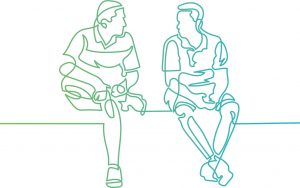It is common for people experiencing emotional distress to have thoughts of harming themselves or that they would be better off dead. If you are feeling concerned about your safety, it’s important that you tell someone – you don’t need to struggle alone. Please do speak with your Talking Therapies practitioner, course facilitator or make an appointment with your GP.
During your assessment and treatment with our service you will be asked regularly about your safety and also be asked to complete a questionnaire (PHQ9) prior to each appointment. If you have scored 1 or more on question 9 of the questionnaire, this may indicate that you need more support.
We have a duty of care to keep people safe. This is a duty we share with patients and GPs. To share this duty, it is important that we keep GPs updated. Therefore, we inform GPs where we have concerns about a patient’s safety.
You are not a bad person, weak, or flawed because you feel suicidal, experience suicidal thoughts or thoughts of being better off dead. It doesn’t even mean that you really want to die – it only means that you have more pain than you can cope with right now.
You have made the first step by telling your doctor or a health professional. They will have discussed treatments and options with you. If you have been given antidepressants, remember that they take two or three weeks to start working, and then work gradually.
Please use any self-help information your practitioner has provided you with
Try and tell your friends and family, who will support you by spending time with you. Talking to a family member or a friend or a colleague can bring huge relief
Try to avoid long periods of time on your own, especially if you just sit and dwell on things
Plan your day and set small, easy to achieve tasks. This will keep you occupied and give a sense of achievement
You must try and eat, at best little and often, and try to drink up to two litres of water each day
Avoid alcohol and non-prescription drugs
Get someone to help you clear out old medicines and anything harmful when you find yourself dwelling on this
Try to distract yourself by phoning a friend, going out, reading a magazine, etc
Exercise can make you feel better, at least 30 mins a day
Just try and be kind to yourself. It will pass, don’t be afraid of how you feel, try and be brave and keep safe
Samaritans: To speak to a Samaritan volunteer any time of day or night, call 116 123. Calls on this number are automatically sent to the nearest free line, which could be your local branch or another. www.samaritans.org
NHS 111: for 24/7 Mental Health Support
Telephone: 111 (Select Mental Health Option 2)
If it is not a 999 emergency but you are experiencing an immediate mental health crisis, call 111, and select the mental health option. Provides 24-hour expert advice, assessment and support for individuals, their children, or someone they care for with mental health difficulties.
Campaign Against Living Miserably (CALM):
Free and confidential helpline open 5pm – midnight, 365 days a year: 0800 58 58 58. The helpline is for people in the UK who are down or have hit a wall for any reason, who need to talk or find information and support.
Webchat open 5pm – midnight, 365 days a year
Papyrus:
Prevention of young suicide. HOPELINEUK is a confidential support and advice service for Children and Young People under the age of 35 who are experiencing thoughts of suicide or anyone concerned that a young person could be thinking about suicide.
Call: 0800 068 41 41
Text: 07860 039967
Email: pat@papyrus-uk.org
Shout:
Text SHOUT to 85258 for a free and confidential text support service, when texting is easier than saying it out loud. SHOUT is there for moments when you are dealing with suicidal thoughts and need support to get to a calmer place.
Apps:
StayAlive
A suicide prevention app packed full of useful information to help you stay safe.
Calm Harm
https://calmharm.co.uk/
An award-winning app to help you manage urges to self-harm.
Are feelings of suicide common?
Most people at some point in their lives will have a suicidal thought but for the majority this will be a fleeting or at least short-lived experience.
When do suicidal thoughts become problematic?
Thoughts of suicide should always be taken seriously but if these thoughts are persistent, occur frequently, are strong and for the individual there appears to be no alternative, then immediate action should be taken to get support and help.
Contact emergency services
Are you at high risk at this time of killing yourself? Do you have a plan and the means to complete suicide?
If so, call 999 RIGHT NOW.
It’s okay to feel the way you are feeling and there are people around who can help you. When you are feeling suicidal, talk to someone immediately.
If you need immediate help, have seriously harmed yourself or feel you are in crisis, please call emergency services on 999 or ask someone to take you to A&E.
Make an enquiry
If you wish to find out more information about a particular service or have a general enquiry then please complete the form
Vita is an award-winning, CQC registered healthcare provider















